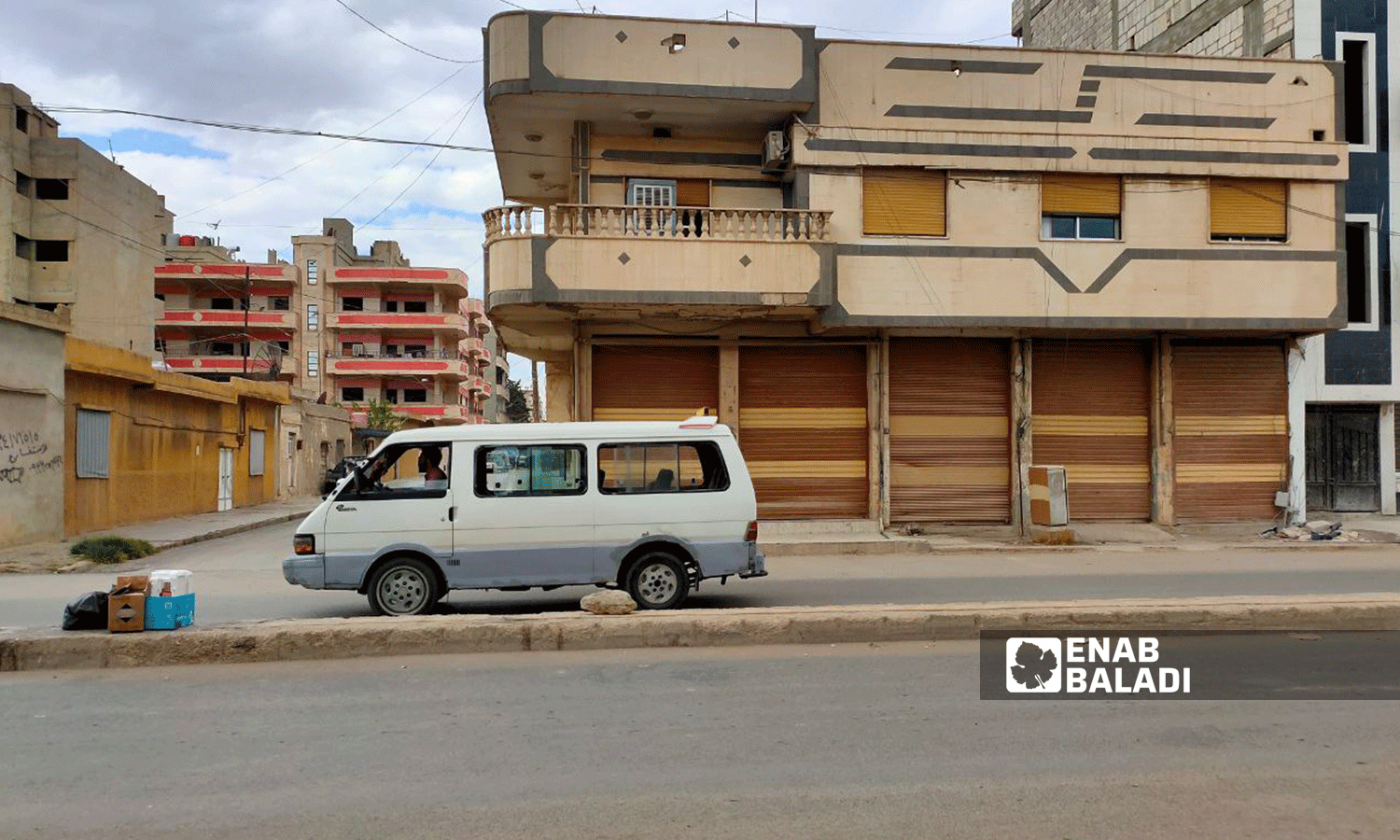



Qamishli – Majd al-Salem
Ali Hussein (pseudonym) and his family have been living in a state of anxiety and instability for three months after losing their house that belonged to one of the housing associations in Qamishli city in northeastern Syria.
Last June, forty-one-year-old Hussein received an eviction notice from the Qamishli Municipal Council of the Autonomous Administration of North and East Syria (AANES), requiring him and his family to empty their house within ten days for lack of “ownership proof documents.”
Hussein confirmed that he has been living in the house for 16 years under a lease contract with the al-Rusafa Housing Association.
Hussein told Enab Baladi that he refused to leave the house despite the Municipal Council’s repeated harassment, which increased significantly in September.
However, Hussein fears the possibility of getting forcibly evicted, along with his children, particularly that the Municipal Council did not offer them alternative housing in case the eviction decision was implemented.
In addition to Hussein’s case, there are nearly 45 other families “threatened with eviction at any moment.”
Enab Baladi tried to reach officials in the al-Rusafa Housing Association _founded more than 30 years ago in Qamishli city_ to inquire about the eviction issue; however, its efforts were unsuccessful.
A lawyer familiar with the eviction case of the al-Rusafa Association’s houses told Enab Baladi on the condition of anonymity for security reasons, that “The eviction notice is not legally binding as it was not issued by a competent court, but by leading figures in the Syrian Democratic Forces (SDF),” the military wing of the AANES.
He explained, “Some SDF leaders are working on evicting residents under a legal cover, aiming to unlawfully appropriate the al-Rusafa Association’s houses amounting between 40 and 50 residential apartments. These apartments are the property of the Syrian government in Qamishli and are inhabited by state employees and retirees either under-sale or lease contracts conducted 20 years ago.”
Dozens of families in Qamishli city have lost their homes after being destroyed or seized by the SDF, under security pretexts or routine procedures.
Since many families lost their official documents during battles against the Islamic State (IS), it became difficult for them to prove ownership of their houses. The issue was further complicated by the AANES’ failure to solve the problem by providing an alternative mechanism protecting homeowners’ property rights.
The lawyer pointed out that the eviction issue did not start with the al-Rusafa Association’s houses, as several households in the al-Mahata neighborhood in Qamishli were asked to empty their homes.
He added, the Syrian government allocated these dwellings to the employees of the Qamishli train station before 2011, and the SDF wanted to appropriate them the same way it seized the houses of Rmelan town and those of the al-Rusafa Association in al-Jawadiyah town, where it expelled most of the employees out of their houses and placed the families of its leaders and fighters in their places.
The lawyer said those threatened with eviction should hire a lawyer to file a disturbance of possession lawsuit, a real estate legal action taken by a property holder against anyone disturbing his/her possession to prohibit claims against possession, provided that it is based on a legal and stable ground.
In this case, legal action might be taken against the Qamishli Municipal Council to prevent interference with possession (forced eviction), with the court’s ruling placed under obligatory implementation.
The SDF controls most of al-Hasakah governorate, its major economic sectors, and the majority of official circles, which were transformed into military headquarters or incorporated into SDF’s administrative institutions.
International laws applicable in conflict situations over governments and non-governmental military actors, namely the International Humanitarian Law and the International Human Rights Law, require all forces to protect civilian property.
Article 17 of the Universal Declaration of Human Rights (UDHR) states that “no one shall be arbitrarily deprived of his/her property.”
As one of the military actors in Syria, the SDF must abide by the mandate protecting civilian property and refrain from tampering with it.
Moreover, the Syrian Constitution of 2012 stipulates the protection of civilian property, as article 15 states that “The collective and individual private ownership shall be protected in accordance with the following basis:
Under international mandates and Syrian law, the SDF and other dominant sides in Syria are violating the Syrian Constitution. They are flouting all constitutional and legal provisions protecting civilian property.
Like other conflicting military bodies, the SDF is exploiting the current situation, civilians’ conditions, especially those displaced and refugees, by tampering with their properties.
On 5 August 2020, AANES’ General Council issued Law No. 7, which consisted of 21 articles under the title “The Absentee Property Protection and Management,” to suspend it later on 12 of the same month.
Back then, the General Council announced that it would reconsider and redraft the law to avoid “consequences resulting from applying the law that could arise from misunderstanding or having different interpretations of its articles.”
Even though the SDF canceled the law, property rights infringements continue to occur in SDF-held areas through the arbitrary seizure of civilian property.
The Syrians for Truth and Justice (STJ) has documented the SDF-affiliated Northern Democratic Brigade’s seizure of over 1,200 residential properties in Raqqa city, northeastern Syria, between late 2019 and June 2020.
In December 2020, the STJ published a report, in which it said that the SDF-affiliated groups had appropriated dozens of civilian houses in different parts of Raqqa city, 80 of which are in the Masaken al-Shurtah neighborhood, to house the Northern Democratic Brigade’s elements and their families.
if you think the article contain wrong information or you have additional details Send Correction